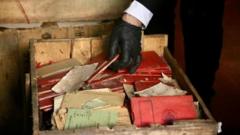An international network of spammers is posting AI-generated images of Holocaust victims on Facebook, a BBC investigation has found.
Organizations dedicated to preserving the memory of the Holocaust are expressing distress over these images, which they say leave survivors and families deeply affected. They have criticized Facebook’s parent company Meta for allowing users to trivialize a historical atrocity.
Only a few genuine photographs exist from Auschwitz during World War Two, yet recently, spammers have flooded social media with fake images, such as a prisoner playing violin or romanticized meetings between lovers at the camp's boundaries, gaining widespread likes and shares.
Pawel Sawicki from the Auschwitz Memorial emphasized that these fabricated narratives distort real suffering. This is not a game. This is a real world, real suffering and real people that we need to commemorate, he stated.
The BBC traced many of these posts to a network based in Pakistan, where content creators collaborate to generate revenue on Facebook through Meta's content monetization program. One account claimed earnings of $20,000 through social media monetization schemes, exploiting the tragic narratives of the Holocaust to drive engagement.
In recent months, the Auschwitz Museum highlighted concerns about such accounts distorting its historical content by using AI models, leading to fabricated stories and inaccurate representations of individuals who suffered during the Holocaust.
The increasing number of AI-generated images alongside misleading narratives has been likened to a form of spamming, earning the term “AI slop.”
Meta acknowledges the issue and has removed several accounts after being alerted to the problematic content. However, the company does not intentionally promote false Holocaust narratives, though it rewards engagement regardless of content authenticity.
As survivors pass away, educators and historians express concern over the misrepresentation of the Holocaust, warning that AI artifacts can blur the lines between fact and fabrication, impacting future generations' understanding of history.



















